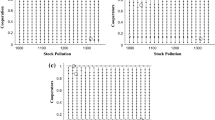Abstract
The purpose of this paper is to introduce the concept of interconnected games and to show its relevance for modeling international environmental problems. It is argued that an interconnected game approach to international environmental problems may enhance cooperation and provide an alternative to the use of financial side payments to induce countries to cooperate. Two types of interconnected games are distinguished in this paper, i.e. direct sum games and tensor games. In the former all the constituting isolated games are games in strategic form and in the latter they are repeated games. In both cases the interconnected game can be interpreted as a multiple objective game, but only the setting where a trade-off is made for the vector-payoffs is considered. In addition to the formal definition of these types of interconnected games, some elementary results concerning Nash equilibria of such games are derived.
Similar content being viewed by others
References
Barrett, S. (1990), ‘The Problem of Global Environmental Protection’, Oxford Review of Economic Policy 6(1), 68–79.
Bernheim, B. and M. Whinston (1990), ‘Multimarket Contact and Collusive Behavior’, Rand Journal of Economics 21(1), 1–26.
Bohm, P. (1990), ‘Efficiency Issues and the Montreal Protocol on CFC's’, The World Bank, Environment Working Paper, Washington D.C.
Folmer, H. and C. Howe (1991), ‘Environmental Problems and Policy in the Single European Market’, Environmental Resource Economics 1(1), 17–42.
Folmer, H. (1993), The Need for Cooperation on International Enviornmental Problems, Mimeo, University of Wageningen, Wageningen.
Friedman, J. (1991, 1986). Game Theory with Applications to Economics, Oxford University Press, Oxford.
Hansen, S. (1989), ‘Debt for Nature Swaps: Overview and Discussion of Key Issues’, Ecological Economics 1, 77–93.
Hoel, M. (1992a), ‘Emission Taxes in a Dynamic Game of CO2 Emissions’, in R. Pethig, ed., Conflict and Cooperation in Managing Environmental Resources. Springer, Berlin.
Hoel, M. (1992b), ‘International Environment Conventions: The Case of Uniform Reductions of Emissions’, Environment and Resource Economics 2(2), 141–159.
Holler, M. and G. Illing (1991). Einführung in die Spieltheorie, Springer-Verlag, Berlin.
Kaitala, V., M. Pohjola and O. Tahvonen (1992), ‘Transboundary Air Pollution and Soil Acidification: A Dynamic Analysis of an Acid Rain Game between Finland and the USSR’, Environmental and Resource Economics 2(2), 161–168.
Mäler, K. (1989), ‘The Acid Rain Game’, in H. Folmer and E. van Ierland, eds., Valuation Methods and Policy Making in Environmental Economics. Elsevier, Amsterdam, 231–252.
Mäler, K. (1990), ‘International Environmental Problems’, Oxford Review of Economic Policy 6(1), 80–108.
Mäler, K. (1991) The Acid Rain Game II. Mimeo. Stockholm School of Economics, Stockholm.
Markusen, J. (1975) ‘Cooperative Control of International Pollution and Common Property Resources’, The Quarterly Journal of Economics 89, 618–632.
van der Ploeg, F. and A. de Zeeuw (1992), ‘International Aspects of Pollution Control’, Environmental and Resource Economics 2(2), 117–139.
Shaw, R. (1988), Transboundary Acidification in Europe and the Benefits of International Cooperation. Paper presented at the conference “Pollution Knows No Frontiers”, Bulgaria 16–20 October 1988.
Tsebelis, G. (1990), Nested Games. University of California Press, Berkeley.
Zhao, J. (1991), ‘The Equilibria of a Multiple Objective Games’, International Journal of Game Theory 20, 171–182.
Additional information
Folmer and v. Mouche: Landbouwuniversiteit Wageningen, Postbus 8130, 6700 EW Wageningen, The Netherlands; Ragland: University of Colorado at Boulder, Boulder, Colorado 80309-0256, U.S.A. An earlier version of this paper was presented at the EAERE conference in Stockholm, June 1991. The authors appreciate comments made by conference participants and journal referees.
Rights and permissions
About this article
Cite this article
Folmer, H., Mouche, P.v. & Ragland, S. Interconnected games and international environmental problems. Environ Resource Econ 3, 313–335 (1993). https://doi.org/10.1007/BF00418815
Issue Date:
DOI: https://doi.org/10.1007/BF00418815




